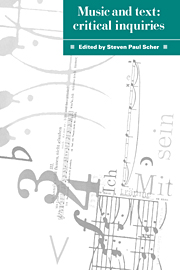Book contents
- Frontmatter
- Contents
- List of figures
- List of contributors
- Preface
- Acknowledgments
- Part I Institutional dimensions and the contexts of listening
- Part II Literary models for musical understanding: music, lyric, narrative, and metaphor
- Part III Representation, analysis, and semiotics
- Part IV Gender and convention
- 12 Whose life? The gendered self in Schumann's Frauenliebe songs
- 13 Operatic madness: a challenge to convention
- 14 Commentary: form, reference, and ideology in musical discourse
- Index
14 - Commentary: form, reference, and ideology in musical discourse
Published online by Cambridge University Press: 04 September 2009
- Frontmatter
- Contents
- List of figures
- List of contributors
- Preface
- Acknowledgments
- Part I Institutional dimensions and the contexts of listening
- Part II Literary models for musical understanding: music, lyric, narrative, and metaphor
- Part III Representation, analysis, and semiotics
- Part IV Gender and convention
- 12 Whose life? The gendered self in Schumann's Frauenliebe songs
- 13 Operatic madness: a challenge to convention
- 14 Commentary: form, reference, and ideology in musical discourse
- Index
Summary
The issues raised in this collection of essays touch upon almost all of the aspects of contemporary discussions of language, discourse, and textuality: referentiality and theme, voice and expression, cognitive and ideological codes, audience reception and affect, poetics or style, figurative and literalist meaning, narration and description. Moreover, these issues are considered within the context of the continuing debate between Formalists and Historicists over the relevance of knowledge of social–cultural contexts to the understanding of the forms and contents of artistic, and specifically musical artifacts. Thus, Thomas Grey and Lawrence Kramer deal with the function of metaphor in the musical production of meaning. Anthony Newcomb considers the question of plot in the production of narrative effects in instrumental music. Edward T. Cone discusses the nature of voice in sung speech. John Neubauer, Peter Rabinowitz, and Charles Hamm deal with the “audience's share” in the production of musical meaning. The topic of musical thematics is addressed by David Lewin (with respect to power), Paul Alpers (with respect to “strength to world”), and Ellen Rosand (with respect to madness). And the problem of ideology in musical representation is analyzed by Claudia Stanger and Ruth Solie.
Marshall Brown provides a cultural–historical context for our consideration of these issues insofar as they relate to contemporary musicological research. First, he notes a specifically formal problem confronting the attempt to answer the question posed by Newcomb: namely, how might music mean? He points out that, in the musical work, structure is explicit and meaning difficult to discern, while in the literary work meaning is easily discernible but structure is elusive.
- Type
- Chapter
- Information
- Music and TextCritical Inquiries, pp. 288 - 319Publisher: Cambridge University PressPrint publication year: 1992
- 4
- Cited by



